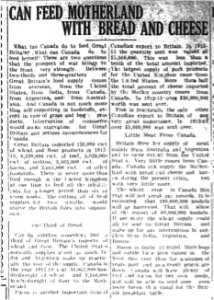On 1 August, the British War Office asked the Canadian Government how much wheat Canada could send Britain. Great Britain needed to rely on a Canadian wheat supply because the Russian wheat crop could not be counted on like it had been in previous years. Later in the month, Britain requested that they receive as much of the harvest as possible, that Canada did not export grains to countries outside of the empire and that it set reasonable prices.
Traditionally, Canada was not much more than self-sustaining in most of her foodstuffs, with the exceptions of grain production. Canada recognized that Great Britain would become very dependent on Canada for her grain supply, a challenge that Canada was prepared to meet. In addition to grains, Canada also increased her exports of bacon, cheese, and fish to Britain. Canada estimated the upcoming harvest to yield 180,000,000 bushels, which meant that 80,000,000 bushels could be exported. Other members of the British Empire, such as Australia and New Zealand, were also expected to send as much as foodstuff as possible.
(“Canada Will Send Regiment to Front,” Berlin Daily-Telegraph, 1 August 1914; “Can Feed Motherland With Bread and Cheese,” Berlin Daily-Telegraph, 6 August 1914; “War News,” Elmira Signet, 13 August 1914.)
